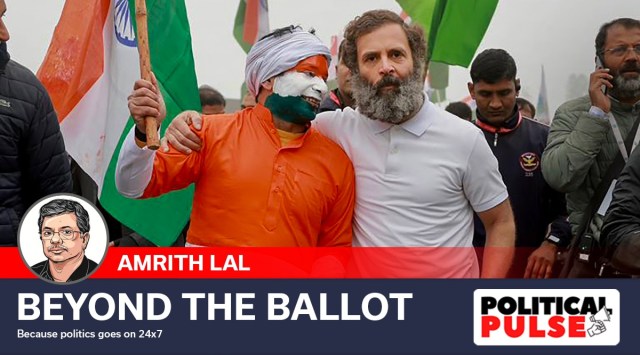Latest Comment
Post Comment
Read Comments
 Congress leader Rahul Gandhi during the Bharat Jodo Yatra in Karnal. (PTI file)
Congress leader Rahul Gandhi during the Bharat Jodo Yatra in Karnal. (PTI file) When the Bharat Jodo Yatra began in September last year, Rahul Gandhi and the Congress had said it was a non-political event and all, irrespective of their party affiliations and ideological beliefs, were welcome. In the course of the yatra, Rahul Gandhi said his intention was to open a shop of love (mohabbat ki dukan) in a bazaar of nafrat (market of hate). By the time it arrived at the Red Fort on Christmas Eve, it acquired a richly layered political message that challenged the ideological foundations of the BJP government.
Union Home Minister Amit Shah’s retort to the Yatra came at a BJP rally in Tripura on January 5. He took Rahul Gandhi’s name and announced that Ram temple would be opened in Ayodhya early 2024, the year of the general election. BJP leader and Maharashtra Deputy Chief Minister Devendra Fadnavis followed in Mumbai by declaring that Rahul Gandhi will be invited to have darshan at the Ram temple. The temple, it is likely, will dominate the BJP’s general election campaign.
A grand Ram temple at the site of the Babri Masjid in Ayodhya was the pronounced goal of a political yatra that transformed India in the 1990s. The political message of L K Advani’s rath yatra was divisive: A slogan that emerged during the rath yatra was “masjid todo”. The rath yatra and its culmination in the destruction of the Babri Masjid on December 6, 1992, started a phase of Hindutva politics, which may find closure with the opening of the temple soon.
Can Rahul Gandhi’s mohabbat message offer a counter to the BJP’s Hindutva agenda? Can mohabbat become a political category in a deeply polarised and competitive electoral arena? Is there a precedent in politics where love was introduced as a political value and succeeded in shifting the dominant narrative?
The idea of the political yatra, perhaps, started with Mahatma Gandhi. His genius reinvented the idea of pilgrimage and married it with the purpose of political mobilisation. The Dandi Yatra had the spiritual aesthetic of religious pilgrimage that all Indians, irrespective of their faith, related to. Its immediate goal was the assertion of political agency and the claim of people over resources. The larger goal, as in all of the Mahatma’s endeavours, was sarvodaya, which arose from the love of all humanity. Gandhiji, influenced by Sermon on the Mount, John Ruskin and Tolstoy, had a deep understanding of politics as a moral action founded on universal love and devoid of any hatred. In the wake of Partition and the violence that ensued, Gandhiji went on a pilgrimage to Calcutta first, and later Noakhali, to spread the message of love. His was not a partisan presence but a moral message that helped to calm, and to some extent heal, a people who had embraced violence, hate and fear. The many years of relative communal peace that India experienced was an after-effect of his martyrdom: Hindu communal voices lost political legitimacy in the wake of the Mahatma’s murder by Nathuram Godse.
Martin Luther King was inspired by Gandhiji’s political ideas. He too believed that love can be a political value and will find takers in a marketplace of hate, as the US had become in the 1950s and ’60s. The 1963 March on Washington was a political event shaped by King’s commitment to love and brotherhood. He was assassinated but America changed forever. The Civil Rights struggle and peace movements were sanctified with his blood.
Vinoba Bhave’s Bhoodan Yatra was founded on the principles of sarvodaya. However, his ascetic demeanour was, perhaps, too sophisticated for taking the message of love or fellowship to the masses though he was not short on intent or integrity.
These are not comparable times. Gandhiji, King or Vinoba were relentless in the pursuit of their ideals, which also inspired many others. They were not merely politicians but tall leaders of people, who would become a “climate of opinion”. They were seekers of Truth, not merely pursuing limited political goals. And that lifted their message from being reduced to banal or slick expressions. The Congress in 2023 is not even a pale shadow of the Mahatma’s Congress. In the course of the Yatra, Rahul Gandhi seems to have endeared himself to many as a friendly, accessible leader. Yet, for him, the Yatra, which ends later this month in Srinagar, may just be the beginning of a long journey if he wishes to build a new politics. What the yatris do after the Yatra ends will have a bearing on its long-term impact.
Can a yatra with mohabbat as its message start a new political cycle as the political goal set by a yatra that divided a nation reaches a closure? Can this be the beginning of a politics of healing, which lets people be less angry and vengeful, shun hate, self-pity and victimhood? The Congress will need to work hard to lighten the burden of its post-Nehru legacy and tap the energy unleashed by the Yatra to pivot the pursuit. It takes a lot of hard work to make a shop profitable.
amrith.lal@expressindia.com